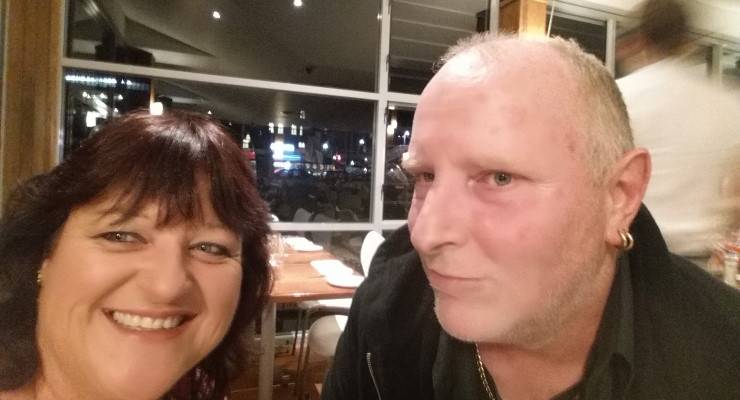
This article discusses self-harm and suicide
Grappling with suicidal thoughts and with a deep cut in his wrist, Todd Malcomson knew his life was in danger. He contacted his wife of 15 years, Natalie, and asked her to call an ambulance.
Malcomson lives with borderline personality disorder and is no stranger to the fluorescent lights of emergency rooms. The hospital is the last line of defence for his mental illness.

When he arrived at the emergency department in Canberra in November last year, Malcomson was told — despite his acute crisis and history of self-harm — it would be five hours until he could see a doctor.
He was given a pat-down when he arrived, but somehow his anti-psychotic and sedative medication ended up next to his bed. It was a busy night and there were no mental health specialist staff in the ward to watch over him and walk him through his psychosis.
In the ER and under supervision, he overdosed on his medication and was then rushed to the ICU where his blood pressure became life-threateningly low. Thankfully he is here today to tell his story.
Revolving door of emergency departments
Hospitals are poorly equipped to cope with those experiencing mental health crises. Staff rarely have specialist training and patients are often discharged to the same situation they came from, where they yo-yo between their support networks, National Disability Insurance Scheme (NDIS) services — for those who have either — and emergency departments. Many experience homelessness and incarceration.
ERs are increasingly their first port of call — presentations have risen by 70% over the past 15 years.
In Australia 690,000 people have a severe mental illness. Fewer than 9% have access to the NDIS. Since the NDIS was implemented, many community mental health services have lost funding and closed.
Sebastian Rosenberg, a senior lecturer at Sydney University’s Brain and Mind Centre, told Inq hospitals have become “the expensive and traumatic front door of our mental health system”.
“[Community-based services] have been replaced with two other systems: mental health wards of general public hospitals, and jail,” he says.
Many, like Malcomson, have to wait until they are in a crisis to get help. Natalie, who runs an emotional living skills program for families living with severe and complex mental illness, ferociously fights for better care for him.
Often her efforts are in vain. She tried to get help at the local community mental health services several years ago.
“They turned him away when he was suicidal, saying there was nothing they could do,” she says. “… Being constantly suicidal and self-harming every day wasn’t sick enough.
“I’m used to having to fight; you’ve got to fight all the time and it’s just tiring … It’s a revolving cycle.”
Hospitals the wrong front door for mental illness
Despite being the front line for acute mental health crises, Tom Ryan, who’s president of the Australian College of Mental Health Nurses, told Inq few emergency departments had specialist staff.
“While there are nurses working in mental health, [most] are not mental health nurses,” he says. “There will be days in acute units where there are no mental health nurses.”
Staff are often ill-equipped to deal with mental health crises. Doctors report becoming frustrated at having their skills diverted from other emergencies.
Numbers have dropped since a Commonwealth-funded mental health nurse incentive program was capped and responsibility for training mental health nurses moved to primary health networks in 2016.
Specialist training is important: a mental health nurse would not leave a patient with their medication and can help talk someone through depressive thoughts or psychosis.
Ryan said a pregnant woman wouldn’t accept being looked after by anyone other than a midwife, and mental health patients should be able to have the same right to specialist care.
“Mental health nurses have a wider range of skills than most practitioners,” he says. “Most are working psychotherapists … and work alongside people who are difficult for most.”
But importantly, Ryan said deploying more mental health nurses to emergency departments was not the solution. They would serve a better purpose in community services.
“Hospitals are the wrong gateway,” he says. “… It medicalises the whole experience.”
Malcomson wished that staff had the training and skills to help him with his illness when he was hospitalised.
“I want them to have compassion for what I’m going through — not understanding, that’s very hard, but compassion,” he says.
A spokeswoman for Canberra Health Services told Inq there was always at least one mental health clinician rostered on in the department — 24 hours a day, seven days a week — who is supported by a psychiatrist.
Discharged to nothing
Not being kept informed of Malcomson’s care is a huge concern for Natalie. Several years ago he was released from the ER early in the morning with no watch or wallet and a phone on low battery. No one told her.
“He was discharged to the darkness,” she says. “Homelessness is not an inhibitor for discharge.”
The Canberra Health Services spokeswoman said a patient must give express approval before family members can be told about discharge.
“If the person does not require an inpatient admission and can be safely discharged home with community supports, they will be,” she said.
Of the 286,985 emergency department mental health presentations across the country in 2017-18, 58.1% left without being admitted or referred to another hospital. Many mental health patients who face long waits as physical emergencies are prioritised leave without seeing anyone.
For Malcomson, having a service between the NDIS — which does not offer funding for treatment — and emergency departments would be a game-changer.
“Having somewhere else to go … with people who understand makes a difference,” he says.
Next: the missing middle in mental health care.
For anyone seeking help, Lifeline is on 13 11 14 and Beyond Blue is 1300 22 4636.








This is another telling article from this author regarding mental health. Awesome, and please keep up your great work.
“Hospitals are the wrong gateway,” he says. “… It medicalises the whole experience.”
So can we say cutting funding for mental health, or, redirecting funds through the maze of the industrial medical and health complex, which is really cutting funding, that this is perhaps commercializing health care politically in whatever direction the politicians choose.?
It’s govts that actually contribute to adverse mental health…unemployment, homelessness, drug addiction, alchoholism, s-xual abuse, domestic violence, too many to mention. From the cradle to the grave people know the odds are stacked against them in life and unless they are born on the right side of the tracks there won’t be many opportunities other than scrapping and clamoring over each other just to survive. Facing this is enough to make anyone mentally impaired…even the best of us.
Mentally impaired people need to know it’s not their fault and that successive govts of either persuasion have failed them.
It is significant that this man’s gateway to treatment was actually the ICU, after the ER couldn’t help him fast enough. How much more per hour did it cost us taxpayers to treat him in the ICU than it would have cost to treat him in a much more appropriate community mental health facility?
In a previous life I worked in a physical rehab unit. I remember a young man who attempted suicide by lying down on a busy arterial road. Amazingly, the resulting multiple traumatic injuries failed to kill him, and the health system happily spent tens of thousands of $$ patching him up surgically and rehabilitating him back to a painful and rather precarious level of physical independence. When it was time to discharge him back into the real world, the mental health system was not interested in following him up because he was stable and not in mental health crisis. Not good when the system is crazier than the patients.
“Discharged to nothing” I have/had (I don’t know whether he is alive or not) who was discharged to “Toorak Road” no address, just the road he was living on/near when he was picked up. No one was notified, I was his last contact, and I only found out he was discharged when I went to visit him and he was gone. I tried to find him, but where do you look – Toorak Road?
Absolutely spot on article.
My daughter who has an intellectually disability has been through so much having psychotic episodes over ten years or so. The NDIS system is not able to give her access because, for some years the GP she was going to had no understanding of her condition and what she needed. She couldn’t fill out the form because the register of the language was to high. It is written by bureaucrats with no mental health skills. She has no support other than family at the moment. She is with a new doctor and psychologist. I hope things will change soon.
Thank you for the articles.
Elizabeth